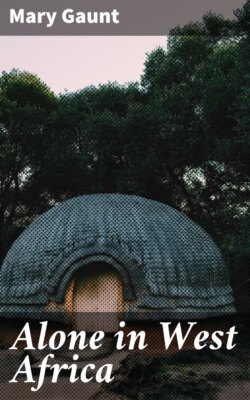Читать книгу Alone in West Africa - Mary Gaunt - Страница 18
На сайте Литреса книга снята с продажи.
Оглавление
Of the history of the fort I know nothing. The bungalow is raised on thick stone walls, and you go up steps to the dwelling-house, past great rooms that are railed off with iron bars. There are ornamental plants there now, but there is no disguising the fact these are evidently relics of old slave days; I presume the barracoons of the slaves. But behind the one-time courtyard is filled up and sown with Bahama grass kept close-cropped and green, so that croquet and bowls may be played upon it. The bastions are now embowered in all manner of tropical greenery, and the great guns, the guns that Zachary Macauley used against the French privateers, peep out from a tangle of purple bougainvillea, scarlet hibiscus, fragrant frangipanni, and glorious white moon flowers.
There are white women in Freetown, not very many, but still fifteen or sixteen—the wives of the soldiers, of the political officers, medical officers, and the traders, and their number is growing, so that when the Governor gives a garden-party, the lawn that was once the courtyard of the fort is gay with bright muslin dresses, ribbons, and flowers. They seemed to like it too, those to whom I spoke, and there is no doubt that the place is improving from a health point of view. Until within the last two or three years the management of sanitary affairs was in the hands of the Town Council, of whom a large number were negroes, and the average negro is extremely careless about things sanitary; at last, so evil a reputation did the most beautiful town on the Coast get that it was found necessary to vest all power in the hands of a strong and capable medical officer, and make him responsible for the cleanliness of the town. The result, I believe, has more than justified all hopes. Perhaps some day the town may be as healthy as it is beautiful.
But I really know very little about Sierra Leone. I intended to come back and go up the railway that goes a couple of hundred miles up country, but as yet I have not had time, and all I can speak about with authority is its exceeding beauty. The streets are wide and rather grass-grown, for it is difficult to keep down vegetation in a moist and tropical climate, and I am glad to say there are, though the town is by no means well-planted, some beautiful trees to be seen. Government House is embowered in verdure, and the first station on the railway that runs up to the hill-top is “Cotton-tree.”
And the dwellers in this earthly paradise? Knowing their pathetic and curious history I was anxious to see this people sprung from men and women gathered from all corners of Africa, unfortunate and unhappy.
Frankly, I share with the majority of Coasters a certain dislike to the educated negro. But many of the men I like best, the men whose opinion I have found well worth taking about things West-African, tell me I am wrong. You cannot expect to come up from savagery in a few decades, and the thing I dislike so in the negro clerk is but a phase that will pass. Here in Sierra Leone I met one man who made me feel that it would pass, that the time will come when the colour of the skin will make no difference, and that is the African known to all the world as Dr. Blyden. He is an old man now and he was ill, so I went to see him; and as I sat and talked to him one still, hot evening, looking down the busy street where men and women in all stages of dress and undress were passing to and fro, carrying burdens on their heads, shrieking and shouting at one another in the unintelligible jargon they call English, had I not looked and seen for myself that his complexion was the shadowed livery of the burnished sun, I should have thought I was talking to some professor of one of the older Universities of England. His speech was measured and cultivated and there was no trace in it of that indescribable pompous intonation which seems peculiar to the educated black man. He gave me good advice, too.
